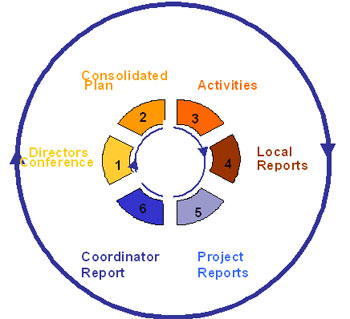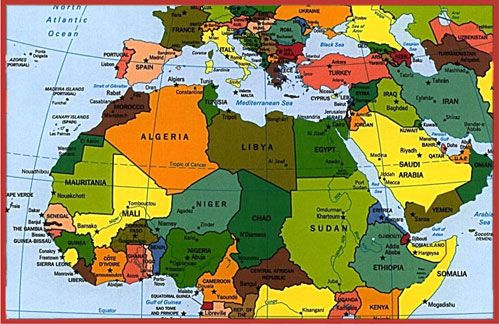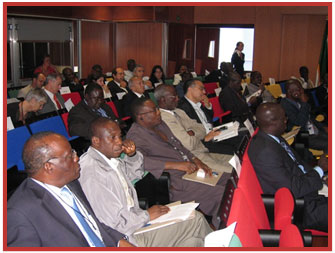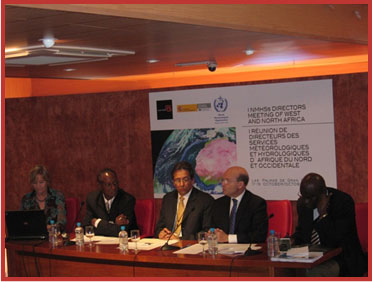- Details
- Category: Who we are
The Directors’ Conference is the core of AFRIMET Cooperation Programme decision-making.
The Programme has a Secretariat, which consists of the manager of the WMO Regional Office for Africa, and the Programme Coordinator, assigned by the Spanish Meteorological Agency (AEMET).
The programme is organised into Projects. Each one has a WMO technical Focal Point and an AEMET coordinator Focal Point, which manages the project, maintaining close contact with the local Focal Points in each of the project’s participating countries. The Projects are separated into different Actions.
The Programme is to be managed performing the following steps:
1. Directors’ Conference Meeting. Analysing countries’ needs and decision-making. Approving the Declaration and Action Plan.
2. The Programme Secretariat and the Focal Points Project Managers will consolidate the Plan and financial budget.
3. The Secretariat will approve the Actions. The technical, coordinatior and local Focal Points and the Secretariat will develop the technical and administrative activities.
4. The local Focal Points will produce reports for the Project managers.
5. The project managers will produce reports for the WMO Regional Office for Africa and the AFRIMET coordinator at AEMET.
6. The AFRIMET Coordinator will produce a report for the Directors’ Conference.

The Conference’s main objective is for all of the countries to work together, therefore making it easier to detect problems and adopt decisions.
The AFRIMET cooperation programme is based upon solid foundations for creating NMHSs with regards the measures to be established in the annual “Action Plans”, which evaluate the actions and set dates. The cooperation model among the West African NMHSs is trying to find synergies that are to be the result of implementing a regional approach.
The projects are firstly carried out in pilot countries, and will then be taken on to other countries that wish to join at later stages, once success is assured.
The Conference is financed by the AEMET trustee fund retained in the WMO, which is a seed fund, designed for creating ability. Additional funds would be needed for pilot projects to become operational services. Therefore, actions designed at mobilising resources should be considered. The Conference will accept any type of financial support from financial agencies.
- Details
- Category: Who we are
|
BÉNIN |
Service Meteorologique National du Benin >> |
|
BURKINA FASO |
Direction de la Météorologie >> |
|
CAP-VERT |
Instituto Nacional de Meteorologia e Geophísica >> |
|
CÔTE D'IVOIRE |
Direction de la Météorologie Nationale |
|
GAMBIE |
Department of Water Resources |
|
GHANA |
Meteorological Services Department >> |
|
GUINÉE |
Direction Nationale de la Météorologie >> |
|
GUINÉE-BISSAU |
Météorologie de Guinée Bissau >> |
|
LIBÉRIA |
Ministry of Transport |
|
MALI |
|
|
MAURITANIE |
Office National de Météorologie >> |
|
NIGER |
Direction de la Météorologie Nationale >> |
|
NIGERIA |
Nigerian Meteorological Agency (NIMET) >> |
|
SENEGAL |
Direction de la Météorologie Nationale >> |
|
SIERRA LEONE |
Meteorological Department |
|
TOGO |
Direction de la Météorologie Nationale |
|
SPAIN |
Agencia Estatal de Meteorología (AEMET) >> |

- Details
- Category: Who we are
The first meeting between the West African National Meteorological Services, the Spanish Meteorological Service (AEMET, then INM) and the World Meteorological Organization (WMO) Secretariat was held in February 2007 during the Regional Association I meeting in Ouagadougou (Burkina Faso).
Subsequent meetings where held also in March 2007 during the "WMO International Conference on Secure and Sustainable Living Conditions: Socioeconomic benefits of weather climate and water services" (Madrid, Spain) and in May 2007 during a side meeting at the XV WMO Congress in Geneva (Switzerland).

Following the previous experience that has been employed successfully to implement regional and national cooperation projects with the Ibero-American Meteorological Services Conference, it was proposed to start working together as a West African Directors’ Conference.
This meeting took place in Casa Africa, at Las Palmas de Gran Canarias (Canary Island, Spain), between the 17th and 19th of October 2007. The Secretary-General of WMO, Mr. Michel Jarraud, and the Secretary-General for Pollution, Prevention and Climate Change of the Ministry of Environment of Spain, Mr. Arturo Gonzalo opened the meeting. It was attended by the Directors of the National Meteorological and Hydrological Services (NMHS) of the region, representatives from ECOWAS, the Africa Union, AGRHYMET and ACMAD and also representatives from European Meteorological Services.

It was expressed the appreciation to the Government of Spain and AEMET and World Meteorological Organization (WMO) for their commitment to support the development of the National Meteorological and Hydrological Services (NMHS) of the region to contribute to the sustainable development of their respective countries.
The main outcome of this meeting is the Las Palmas Statement and an Action Plan to be followed during the year 2008.
Las Palmas Statement (summary):
We, the Directors of North and Western Africa NMHSs, including Spain as Member of WMO Regional Association I:
Recognizing the new challenges produced by climate change especially for developing countries and the role that the NMHSs should play in support to adaptation policies;
Recognizing also that most countries in North and Western Africa region are Least Developed Countries and that five of them come from recent war conflicts;
Welcoming the presence in the meeting of representatives of regional integration organizations such as African Union and ECOWAS and recognizing the relevance and need of their political support for the development of the NMHSs in the region;
Also welcoming the presence of observers representing development partners such as the IM of Portugal, MétéoFrance and NOAA;
Considering the Madrid Declaration and Action Plan emphasizing in particular the need to develop case studies on the socioeconomic benefits of the infrastructure and services provided by the NMHSs, and the need to enhance the capacity of these institution;
Being aware of the opportunities for capacity building offered by the Africa Plan of the Government of Spain and the Trust Fund created in the WMO Secretariat by Spain as well as by other initiatives,
Recognizing the importance and advantages of mutual cooperation to accomplish the mission of NMHSs,
Decided:
1. To establish a Forum of Directors of NMHSs including the organization of an annual meeting in the initial phase.
2. To develop and implement both Annual Plans and a long term Action Plans.
3. To use as a main source of seed funding for the projects and activities in the Action Plan the Trust Fund created in the WMO Secretariat by Spain as well as the Africa Plan of the Government of Spain, and also to identify other possible sources of funding.
4. To facilitate the horizontal cooperation in meteorology and hydrology within the region with the purpose of increasing multilateral cooperation.
5. To submit Forum of Directors conclusions to Ministries in charge of meteorology in each participating country, to CILSS, ECOWAS and UMA, as well as to WMO aimed at obtaining support at national and at international levels to these initiatives of cooperation in meteorology and hydrology in the North and West Africa region.
6. To support the organization of the Conference of Ministers responsible of meteorology.




